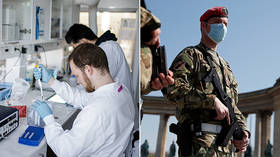As scientists break down borders to fight Covid-19, nationalist leaders build them back up

Two opposing dynamics have emerged in the global race for a coronavirus vaccine: unprecedented scientific collaboration on the one hand; and a worrying strengthening of national autarky on the other.
The contrast between the world of politics and governments with that of science could never be starker. While governments have been quick to close their borders and imprison their citizens, the fiercely competitive scientific community has shattered theirs to create unprecedented collaboration and freedom of information-sharing.
The cooperation among the global scientific communities is an inspiration at a time of a grave health crisis. Never before have so many experts in so many countries focused simultaneously on a single topic and with such urgency. Nearly all other research has ground to a halt.
Egos, careers and normal imperatives like academic recognition have been set aside. The traditional publishing paradigm through peer-reviewed journals (which take months to be approved and published) has been set aside. Online and open repositories are making daily research findings available in real time. While this could lead to an ‘infodemic’ of bad information, many believe the benefits of rapid information-sharing far outweigh the disadvantages. And they appear to be right. Researchers have identified and shared hundreds of viral genome sequences. According to the International Federation of Pharmaceutical Manufacturers & Associations, this has resulted in more than 200 therapeutics currently in clinical trials and more than 20 vaccines in development for Covid-19.
This is inspirational and grounds for optimism. It simply highlights how people will rise to the occasion when times demand it. This is what human beings do.
While the coronavirus global arms race and those involved dominate the headlines, other equally laudable human actions are hidden. For example, a crowdsourcing research platform – Zooninverse – announced this week that it now has two million active non-expert researchers collaborating to solve real issues like fighting antibiotic resistance and tuberculosis. Their operation, Bash the bug, uses a genetics-based approach to improve the treatment of TB (one of the top 10 causes of death worldwide) by reducing the spread of bacterial resistance to antibiotics. Due to the incredible rate at which gene sequencing has got faster and cheaper, it is now possible to replace traditional lab-based methods of research with approaches using genetic technology. This means researchers who are not scientists can join the fight to understand which changes in the bacterial genome (mutations) lead to antibiotic resistance. Mass crowdsourced efforts enable the identification of antibiotics that can be used to treat a particular patient in around a week, rather than a month.
These examples, which are enabled by ingenious technological breakthroughs, highlight just how remarkable humanity truly is. But the course of true love never runs straight. There are counteracting tendencies which darken and threaten the positive impulses behind these phenomena.
Also on rt.com Magic bullet for Covid-19? Scientists look to century-old plasma treatment, but there are some big ‘BUTS’The real threat of the Covid-19 crisis, besides the threat posed to human life, is the strengthening of autarkic and nationalist sentiments. The tit-for-tat politicization of the crisis by the US and China – each fueling conspiracy theories about the origins of the virus – might be seen as childish and irresponsible. But there is a deadly reality lurking behind this.
It has dawned on all governments that biotechnology, pharmaceuticals and medicine manufacturing have become core to national security. In China, the search for a vaccine has been militarized: over 1,000 scientists have been mobilized and, through the Academy of Military Medical Sciences, a candidate for success has already been developed. Volunteers are now being recruited for clinical trials. In the US, President Trump tweets his electoral pledge with American flags to put America first: ‘When we achieve this victory, we will emerge stronger and more united than ever before!’
The scientists might be breaking down borders and developing new ways of collaborating and communicating. But the politicians are erecting new ones in a bid to become the first to find a vaccine. The country’s scientists who make the initial breakthrough will give that country both untold health and economic advantages. The stakes are very high – not just for nationalist politicians – but for humanity.
It seems the stark choice looming before us is to cooperate and move forward together or compete and intensify nationalist fragmentation and protectionism – ‘viruses’ that will prove to be far more deadly than anything Covid-19 poses today.
Think your friends would be interested? Share this story!
The statements, views and opinions expressed in this column are solely those of the author and do not necessarily represent those of RT.













